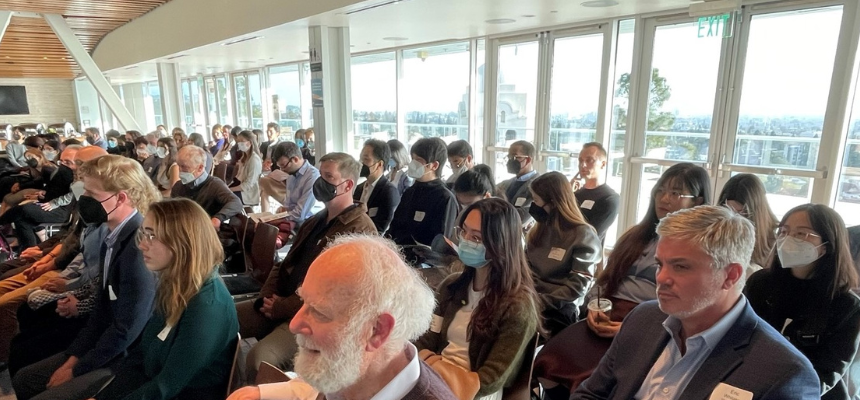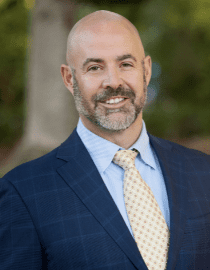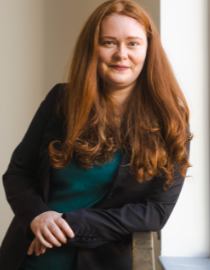
By Gwyneth K. Shaw
After more than a quarter century of leadership, tech law scholars and practitioners know they can turn to the Berkeley Center for Law & Technology (BCLT) for the latest on what’s happening in a field that’s constantly growing and changing.
Even so, the center’s most recent moves showcase a trajectory that’s even more steeply headed up.
Just since the start of the year, the center has run the 10th edition of its privacy law forum, held the first Advanced Life Sciences Institute, honored a legend at the David E. Nelson Memorial Lecture, and co-hosted a jam-packed symposium on the growth and evolution of the critical right to repair devices, from iPhones to tractors. This week, the fourth annual Berkeley-Tsinghua Conference on Transnational IP Litigation will examine the increasingly vital role of cross-border litigation.
Crowning this sizzling spring was a brand-new event — Berkeley IP & Tech Month — which offered 30 virtual sessions led by experts from Berkeley Law and Silicon Valley’s top firms, with each course eligible for Continuing Legal Education (CLE) credit.
Even better, BCLT bundled the sessions onto a new platform so practitioners can access them, and snag their CLE credits, anytime. The brand-new B-CLE platform will be free to anyone for the first month and free to any University of California graduate after that.
“As part of our mission as a public university, we are focusing on making this high-end material available, at no charge, to companies and attorneys that normally don’t have access to high-end education materials,” BCLT Executive Director Wayne Stacy says.
Want to learn more about the new B-CLE platform? Click here to explore the offerings and sign up for an account.
Growth mindset
It’s the latest iteration of BCLT’s history of fostering conversations between academia and the industry. The center boasts 18 faculty co-directors and more than 40 instructors who are practitioners, and is the hub for law students interested in intellectual property and technology law.

Berkeley Law Professor Peter Menell, one of BCLT’s original founders, says the sessions — which reached nearly 4,000 participants live — and their on-demand availability breaks new ground in the center’s longstanding commitment to educate judges, policymakers, practitioners, and students.
“This model harnesses the unparalleled excellence, breadth, and depth of the BCLT community and helps to level the educational playing field — key parts of BCLT’s and Berkeley Law’s mission,” he says.
Founded in 1995, the center is one of Berkeley Law’s crown jewels, helping the school nab the No. 1 ranking for intellectual property law among U.S. law schools by U.S. News & World Report for 19 years. Last year, the center added life science to its longtime pillars: Patents, copyrights, and trade regulation; privacy and cyber; technology and societal impact; and information technology.
“We’re expanding our impact in tech and life sciences by making this advanced material available at no charge to all lawyers in the tech and IP fields,” Stacy says. “In-house counsel, smaller law firms, government attorneys, and nonprofit attorneys will now have access to the same material as their Big Law colleagues — and our new on-demand platform makes sure that these attorneys have year-round, instant access to everything that we do.”
The IP & Tech Month sessions, all recorded in April, run the spectrum from traditional IP law to a huge variety of specialties, including artificial intelligence, music copyright issues, and even plant patents. Allison Schmitt ’15, a seasoned litigator who took the helm of the Life Sciences Project last year, says the programming’s depth and breadth shows BCLT can bring experts together to engage with just about any area of IP and technology law.
“This new platform will help us fulfill our mission: To generate and share knowledge on a wide range of IP and technology law topics,” she says. “We will now be able to share this knowledge with a much broader audience than we previously could reach.”

One of Schmitt’s goals when she returned to Berkeley Law was to build a community among those practicing in the life science sector, especially younger or less experienced practitioners. The inaugural Advanced Life Sciences Institute was a huge opportunity to foster growth in that area, particularly since it was held in person after a long pandemic-induced dearth of face-to-face meetings, Schmitt says.
This year’s edition focused on IP and licensing and offered free virtual prep sessions as well as plenty of built-in networking time to encourage conversations.
“The speakers did a fantastic job of engaging deeply with the hottest topics in IP and licensing in the life sciences, and sharing their thought-provoking insights on these issues with the audience,” Schmitt says. “We had a terrific turnout, and we look forward to building on this success with future programs and conferences.
“Events like this, which bring together a diverse group of law and science students, academics, government attorneys, in-house counsel, and firm lawyers, are crucial to continue fostering the life sciences legal ecosystem that BCLT seeks to support.”
Hot topics
Just before IP & Tech Month kicked off, the center’s annual symposium with the student-run Berkeley Technology Law Journal examined the so-called “right to repair” — essentially, the effort to force companies to make their products serviceable by consumers rather than only by manufacturer-approved technicians or engineers. While it might be just a nuisance for the average AirPod owner to be unable to swap out a faulty battery, it’s a significant challenge across big sectors of the economy.
The virtual symposium looked at the issue from numerous angles, from IP challenges to consumer protection to possible policy changes. It featured a host of experts from around the world, including Berkeley Law Professors Pamela Samuelson, Abbye Atkinson, Robert P. Merges, Chris Hoofnagle, and closing remarks by Oregon Sen. Ron Wyden.
The BCLT Privacy Forum drew hundreds of participants to its virtual 10th edition, honoring Penn Law Professor Anita Allen.
Another in-person event, the David E. Nelson ’59 Memorial Lecture in March, brought attendees to the UC Berkeley University Club to hear Merges discuss recent research that examines IP’s impact on research and development and the economics of licensing transactions. His lecture was followed by a “fireside chat” with Schmitt and Barbara Kosacz, chief operating officer and general counsel at Kronos Bio, Inc., responding to his remarks, and a job fair for students — another way to forge connections between practitioners and their future peers.
Noting that innovation is built into BCLT’s foundation, Stacy sees these new offerings helping the center further cement its position as the go-to resource for the industry.
“BCLT has always created incredible, cutting-edge material,” he says. “This is the type of material that impacts the development of law and policy in the tech and life science world, and we want to be the hub that helps expand that network of knowledge.”